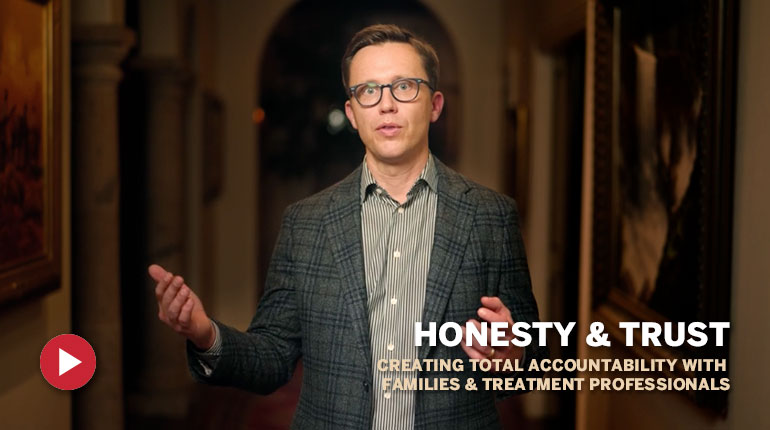I’ve sat with many people starting their recovery journey, struggling to find words that could break the lies they’ve built around their lives. For those who have relapsed repeatedly, honesty is the one thing we have found completely lacking.
That instinct to lie and deflect is part of the fuel that keeps addiction caught in a seemingly endless loop. The moment someone finally breaks through that barrier of dishonesty, it’s like watching a dam burst. Suddenly, there’s a flood of possibilities for real, lasting recovery.
And I’m not just talking about telling the truth versus lying in general. In recovery, honesty is about the stories we tell ourselves and the intricate dance between continued addiction or a new era of recovery, between the selfish compulsion to lie, cut corners, and evade, or the countervailing approach to living life with integrity and honesty.
As you would guess, honesty and accountability are important pillars of our long-term treatment program at Burning Tree Ranch, so let’s take a deeper look at why these principles are so difficult for the chronic relapser, and how we can start to chip away at those walls.

Chronic Relapse at a Glance
Before we dive into the communication aspect, let’s take a moment to understand what we mean by chronic relapse. It’s a pattern where someone repeatedly attempts to quit using (or quit escaping the consequences of) substances, manages to stay abstinent for a period, but then falls back into use. This cycle can repeat itself indefinitely until death, often leaving both their loved ones feeling frightened, hopeless, and exhausted.
Chronic relapse isn’t just about the act of using substances again. It’s a complex interplay of psychological, spiritual, and behavioral factors that keep someone trapped in a cycle of addiction.
At the heart of it lie some important factors. Namely, a lack of honesty, and an unwillingness to do the things that recovery demands.
Importance of Honest Communication in Recovery
Honest communication plays a pivotal role in recovery, especially for those dealing with chronic relapse. Beyond simply telling the truth on any given matter, honesty in recovery is about fostering an environment of accountability.
When someone in recovery communicates honestly:
- They can build and maintain trust with their support system
- Treatment providers can offer more effective, tailored support
- Underlying issues driving the addiction can be addressed more directly
- Early warning signs of potential relapse can be identified and managed
And yet, while most individuals vocalize “how important” honesty is to them personally, engaging in real, honest behavior is the one thing they seem to resist most.
You might be wondering why this is the case…
If the chronic relapser were being honest, here’s what you might hear:
- “If I become honest, you might hold me accountable.”
- “If I become honest, I may not be able to manipulate you.”
- “If I become honest, I won’t be able to play like I am the victim.”
- “If I become honest, my excuses will no longer work.”
- “If I become honest, it will reveal the depths of my unwillingness.”
- “If I become honest, It will expose my true and selfish intentions.”
At the end of the day, when the chronic relapser begins their journey into real honesty… the codependent and enabling supporters they have nurtured begin to slowly open their eyes.

What Does Dishonest Communication Look Like in Recovery?
Without honest communication and accountability, it’s extremely difficult (impossible, really) to make any progress towards recovery. Therefore, the first step is to recognize these patterns and behaviors, and to build a support network that doesn’t play into these manipulations. These behaviors often become so ingrained that they feel like second nature to the individual, and to the family.
Patterns of Lying and Manipulation
Chronic relapsers tend to distort the truth of the matter or create elaborate stories to hide their behavior. This can involve fabricating events, people, or circumstances to explain away the facts. Ever felt like you’re going crazy as you navigate yet another story of deception with the chronic relapser? That’s not a mistake!
What it Looks Like: Sarah tells her family she’s been working late at the office, when in reality she’s been drinking in her car after work. She even goes as far as creating fake work emails to show her family as “proof” of her late nights.
Minimizing or Denying Substance Use
When confronted about their substance use, individuals may downplay the amount they’ve consumed or flat-out deny using at all, even in the face of clear (overwhelming) evidence. This may even include arguments that appear logical on the surface, but are often deflective in nature.
What it Looks Like: Despite smelling of alcohol and slurring his words, Tom insists to his wife that he’s only had “one beer” and that they’re overreacting to his behavior.
Avoiding Difficult Conversations
Most people don’t like confrontation, but chronic relapsers often become highly adept at steering conversations away from topics related to their substance use or recovery progress. They may change the subject, create distractions, or physically remove themselves from situations where these discussions might arise.
What it Looks Like: Whenever his parents try to discuss his recent behavior, Jake suddenly remembers an “important errand” he needs to run or starts an argument about a totally unrelated topic.
Making Promises They Can’t Keep
In an attempt to appease loved ones or avoid consequences, individuals may make grand promises about their sobriety or future behavior, without any real intention or ability to follow through. Unsurprisingly, actions speak louder than words, which is why we embrace a realistic progress-based approach to treatment at Burning Tree Ranch.
What it Looks Like: Lisa repeatedly promises her children that she’ll attend their school events, only to consistently cancel at the last minute due to her substance use.
Blaming Others for Their Actions
Rather than taking responsibility for their choices, addicts and alcoholics may point fingers at others or externalize their actions by claiming it was actually outside stressors, family pressure, or other external factors “forced” them to use substances.
What it Looks Like: After losing his job due to showing up intoxicated, Mike blames his boss for “having it out for him” and claims the stressful work environment left him no choice but to drink.
Selective Sharing of Information (Lying by Omission)
One of the more common ways we see chronic relapsers control the narrative around their substance use is by using lies of omission. In other words, they may share only partial truths, carefully omitting details that might reveal the full extent of their substance use or the consequences of their actions.
What it Looks Like: When discussing her day with her spouse, Maria mentions going to a recovery meeting but conveniently leaves out the fact that she left early to meet up with old using buddies.
Triangulation and Manipulation
In this form of dishonest communication, the individual presents contradictory information to different parties, often with the intent to manipulate perceptions, create conflict, or avoid accountability. This is very common in a professional treatment setting where it is beneficial to have family involvement in the treatment process.
What it Looks Like: During a treatment episode, Tara tells her care team that she has a genuine will to change her life and embrace sobriety. Later that night, she tells her spouse that the treatment team is incompetent, doesn’t listen, and forces her to engage in therapies she’s uncomfortable with.
These behaviors are a reflection of the dishonest, manipulative inner character of addiction. Afterall, whoever said, “addiction is the epitome of transparency and honesty?”

What Are the Emotional Drivers Behind Dishonesty?
Dishonest behaviors usually stem from a strong desire to evade accountability.
Why do chronic relapsers willfully resist living in the truth?
- Fear of consequences: Chronic relapsers don’t like consequences. They prefer to engage in their behavior and not be held accountable.
- Protecting the addiction: On some level, dishonesty serves to protect the individual’s ability to continue using.
- Denial: Many individuals vigorously resist the truth, even with themselves.
Impact on Recovery and Relationships
When dishonest communication and manipulation is allowed to go on unchecked, it can have far-reaching consequences for recovery.
Without honesty, treatment progress is hindered as it’s challenging for treatment providers to offer the most effective support.
Repeated dishonesty can severely damage relationships, sometimes irreparably. Trust is eroded even amongst family members and loved ones.
Over time, these dishonest behaviors perpetuate the cycle of relapse because it allows the individual to avoid fully confronting their addiction and taking accountability for their choices.

How Can Families Promote More Honest Communication?
Creating an environment that fosters more honest communication while minimizing manipulation and abuse requires a thoughtful and consistent approach.
Here are thirteen tips that might help:
- Set Clear Boundaries: Establish and communicate clear boundaries regarding acceptable behavior. This includes not tolerating abusive language, manipulation, or harmful actions. Be firm in enforcing these boundaries and consistent in applying consequences if they are violated.
- Use “I” Statements: Encourage honest communication by using “I” statements rather than accusatory “you” statements. For example, say, “I feel hurt when you blame me for things I didn’t do,” instead of, “You always blame me.” This reduces defensiveness and promotes a more open dialogue.
- Avoid Enabling Behavior: Loved ones should refrain from covering up, making excuses, or taking on responsibilities that belong to the alcoholic. Enabling behavior allows them to avoid the consequences of their actions and perpetuates the cycle of denial and manipulation.
- Encourage Professional Help: While loved ones can provide support, they are not a substitute for professional treatment. Encourage the person to seek help from a therapist, counselor, or support group specialized in dealing with alcoholism and anti-social behavior.
- Focus on Behavior, Not the Person: Separate the person from their behavior when discussing issues. For instance, instead of labeling them as “irresponsible,” focus on specific actions like, “When you don’t follow through on your promises, it makes it hard to trust you.” This helps prevent the conversation from becoming a personal attack.
- Limit Emotional Reactions: Manipulative individuals often feed off emotional reactions to gain control. Stay calm and composed during conversations, which can help defuse the situation and reduce the power of their manipulation.
- Engage in Non-Confrontational Conversations: Timing and approach are critical. Engage in conversations when the person is sober and calm. Avoid confrontations during or after drinking, as this is likely to escalate conflict and reduce the chances of meaningful communication.
- Seek Support for Yourself: Dealing with an alcoholic loved one can be emotionally draining. It’s important for you to have a support system, whether it’s friends, family, or a support group like Al-Anon. This provides a space to share your experiences and receive guidance on how to cope.
- Model Healthy Communication: Demonstrate the kind of communication you want to see. Be honest, direct, and respectful in your interactions. Over time, this can help set a standard for how communication should happen in your relationship.
- Accept What You Can’t Control: Understand that you cannot change someone else’s behavior. You can only control how you respond to it. Acceptance of this fact is crucial in reducing frustration and focusing on what you can influence.
- Consider a Family Intervention: In some cases, a structured intervention with the help of a professional can be effective. This should be carefully planned and executed with the guidance of someone experienced in addiction and behavioral issues.
- Avoid Playing into Blame Games: Don’t get drawn into arguments about who is at fault. Acknowledge their feelings but redirect the conversation to focus on the present and what can be done moving forward.
- Promote a Safe and Supportive Environment: Create an environment where the person feels safe to express themselves without fear of judgment. This can help reduce defensiveness and encourage more honest and open communication.
These strategies can help create a more conducive environment for honest communication and reduce the chances of manipulation and abuse. However, it’s important to recognize that change often requires professional intervention.

Establishing Honest Communication During Professional Treatment
Sometimes, despite our best efforts, professional help is needed to address the challenges of honest communication in chronic relapse. Addiction in the family usually means enduring an emotional barrage over time that obscures your ability to navigate communication or reaffirm boundaries.
Treatment approaches that may help support honest communication:
- Individual therapy to address underlying issues driving dishonesty
- Family therapy to improve honest communication patterns
- Specialized treatment programs for chronic relapse that focus on honesty and accountability
At Burning Tree Ranch, we place a strong emphasis on developing honest communication skills as part of our long-term treatment approach for chronic relapsers. We strongly encourage family involvement as we work closely together with both the individual and their family system to break down barriers to honesty and build a foundation for open, transparent living.

Walking the Path Towards an Honest Recovery
There’s a reason we emphasize honesty & accountability at Burning Tree Ranch. Engaging fully in recovery requires vulnerability, courage, and a willingness to face uncomfortable truths.
When individuals can embrace honesty – with themselves, their loved ones, and their treatment providers – they open the door to genuine healing and lasting recovery. They become open to doing something different than what they’ve come to learn. They start to rebuild trust, strengthen their support systems, and develop the self-awareness needed to navigate the challenges of long-term sobriety.
It starts with small steps – a moment of vulnerability, a difficult truth shared, a willingness to listen without judgment. Each of these moments builds towards a future where honesty is not just possible, but natural and liberating.
We know how difficult it can be to rebuild trust during or after a period of relapse. All of our families share one thing in common, regardless of circumstance – they care deeply about their loved one. If you’re willing to trust us, then our team will provide treatment and support that’s spearheaded by honesty.
That’s part of our promise to help create a life of excellence beyond sobriety.
Until next time,
Brook




